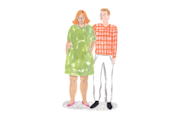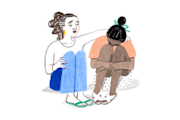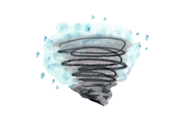We reached out to three Monarch clinicians for their recommendations on the best mental health books recommended by therapists.
Whether you are in the midst of your therapy journey, or taking that brave first step, we hope these reads can help shine some light and insight on your path to mental health wellness.
If you're a parent, teen, or child, you may also want to check out our list of the 18 best mental health books for parents, teens, and kids.
Best books about mental health recommended by therapists


1. Boundaries: When to Say Yes, How to Say No to Take Control of Your Life by Henry Cloud and John Townsend
Cloud and Townsend’s quintessential book about emotional boundaries was one of the first books I began referring to my clients. I have encouraged clients to use it as a reference in determining not only the lack of boundaries in their lives, but how to identify, build and communicate healthy boundaries in their relationships.
Cloud and Townsend identify the “Ten Laws of Boundaries” which help people recognize boundaries are NOT about doing something to someone else, but about learning to protect oneself from the boundary violations of other people.

2. Love is a Choice: The Definitive Book on Letting Go of Unhealthy Relationships by Robert Hemfelt, Frank Minirth, and Paul Meier
The authors surmise codependency can result from various types of abuse in childhood, including active abuse, passive abuse, emotional incest, unfinished business, and negative existential messages (you will have to read the book to find out more). Ultimately, there are vast portions of childhood that are lost because of the abuse.
"Love is a Choice" offers a 10-stage codependence recovery process. This self-help method includes exploring your past and present, taking a relationship inventory, saying goodbye to “security symbols,” grieving the loss of these symbols, reparenting and maintenance.

3. The Verbally Abusive Relationship: How to Recognize It and How to Respond by Patricia Evans
An oldie but a goody! Now in its 3rd edition, The Verbally Abusive Relationship was first published in 1992. This book was the first I read that referred to the communication by the verbal abuser as “crazy making.” Crazy making communication leaves the victim questioning her perception of what is happening.
Evans does a stellar job of identifying the subtle verbiage used by the verbal abuser. Verbiage, by itself would not be considered abusive, but because of the sinister nature of its intent, leaves the victim questioning the abuser’s meaning and her own perceptions.

4. Running on Empty: Overcome Your Childhood Emotional Neglect by Jonice Webb
Some years ago, as I was researching for a presentation on manipulative relationships, I came across Childhood Emotional Neglect, or CEN for short.
Raised in a family where parents are physically, but not emotionally present, the CEN adult experiences symptoms including feelings of emptiness, feeling hopelessly flawed, and difficulty identifying, feeling, or expressing emotions.
Dr. Webb discusses multiple ways to recover from CEN. From understanding how to identify emotions and feelings to learning how to nurture ourselves, she creates a recovery process that results in empowerment and interdependence.

5. Facing Codependence: What It Is, Where It Comes from, How It Sabotages Our Lives by Pia Mellody, Andrea Wells Miller and J. Keith Miller
One of my favorite books takes a look at codependency through the lens of addiction. Written by three authors, it's a deeper look at one of the authors, Mellody, and her journey with codependency.
She sees codependency as a result of childhood trauma, which makes an individual vulnerable to the pitfalls of dysfunctional adult relationships.
This book discusses the impact that childhood trauma has on our emotional wellbeing and our ability to have meaningful and fulfilling relationships with ourselves and with other people.

6. Healing from Hidden Abuse: A Journey Through the Stages of Recovery from Psychological Abuse by Shannon Thomas
Many times, my clients will come in having done their own research on their relationship, their partner, or the crazy making behaviors they have experienced.
Rooted in research on the effects of psychological abuse, Shannon Thomas starts with the basics of psychological abuse. She then discusses, in depth, the 6 stages of recovery.
From the “aha” moments to the realization that victims are not alone in the exasperating experiences, Thomas walks readers through the importance and the difficulty of building boundaries, restoring and rebuilding our life, and benefiting from the hard work of recovery.


7. My Grandmother's Hands by Resmaa Menakem
An incredibly well-written book that explains how racism and generational trauma not only come from a cognitive place, but a body place. This book assists with shifting, enlightening, and challenging the views one may hold regarding race, and explores the intersection between neuroscientific and somatic ways of healing.

8. It Didn't Start with You: How Inherited Family Trauma Shapes Who We Are and How to End the Cycle by Mark Wolynn
A fascinating read that explains epigenetics, inherited family, and intergenerational trauma.
Backed by research, neuroscience, and personal accounts, this book provides a clear explanation of where and how trauma is passed on generationally. It teaches how to break free from the patterns and old stories so you can begin to work toward deep healing.

9. The Polyvagal Theory in Therapy by Deb Dana
Exploring the nervous system, The Polyvagal Theory assists therapists who are treating trauma, in breaking down the steps of how to apply these interventions in session to decrease symptoms and to help clients have a clearer understanding of one's physiology, their responses and ways of finding internal safety and connection.


10. Loving with the Brain in Mind by Mona DeKoven Fishbane
This book is for therapists and couples to better understand how neurobiology can illuminate how the brain works in a relationship. It breaks down how individuals and couples become emotionally dysregulated, and what is happening in their brains when they do.
It also explains new ways of interacting that can lead to a healthier relationship with themselves and others. And then how they can use that information of how new ways of interacting can be learned to lead to a healthier relationship.

11. Love Cycles: The Five Essential Stages of Lasting Love by Linda Carroll
Linda helps us understand the five natural stages of romantic relationships. When we understand these stages, we can learn where we are in the cycle of our relationships and how to stay happy and committed - even through difficult times.

12. Love Skills by Linda Carroll
An expansion on the book Love Cycles book, this provides a practical guide to creating a loving relationship with exercises, self-assessments, and activities to help us learn to deal with conflict without losing connection to our partner.

13. Hold Me Tight: Seven Conversations for a Lifetime of Love by Dr. Sue Johnson
Dr. Johnson helps us recognize that we are emotionally attached to and dependent on our partner in many of the same ways a child is dependent on a parent for nurturing and protection.
She focuses on key moments in a relationship and teaches us how to have seven healing conversations that can help create a secure and lasting bond with our partner.

14. Mindset: The New Psychology of Success by Carol S. Dweck
This book is about a growth or fixed mindset. It discusses how a growth mindset can help us motivate our children, ourselves, and see things in a different perspective.

15. The Body Keeps the Score: Brain, Mind, and Body in the Healing of Trauma by Bessel Van Der Kolk MD
Dr. Van Der Kolk discusses how trauma literally reshapes the brain and body. The book also explores how things such as neurofeedback, meditation, and yoga can reactivate the brain’s neuroplasticity to offer new paths to healing

16. Your Brain on Love the Neurobiology of Healthy Relationships by Stan Tatkin PsyD, MFT (audio only)
Dr. Tatkin helps us understand attachment styles by looking at patterns of intimacy that begin in early childhood and how they impact us. He then guides us through some practices for building security and commitment between partners and anyone we love.

17. Attached: The New Science of Adult Attachment and How It Can Help You Find - and Keep by Amir Levine MD and Rachel S. F. Heller, M.A.
The authors help us take a deep look into the most advanced relationship science today, adult attachment, and how we can use that understanding to help us find and sustain love.
READ NEXT: 18 Books About Mental Health for Kids, Teens, and Parents
Need to find a therapist or counselor? Check out the SimplePractice Monarch Directory to find therapists near you with availability and online booking.







